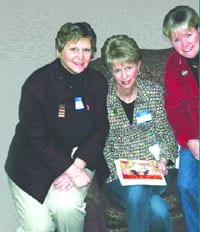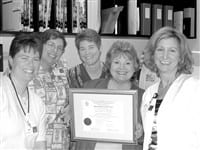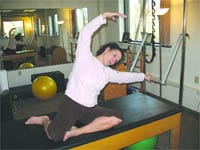Survivors’ Day participants Virginia Marotte, Sandy Yarmac, and Nancy Granger
It was Dibella’s first time coming to the event, staged March 18 at the Sheraton in Springfield and sponsored by Rays of Hope, a fundraising walk-a-thon founded in 1993, and Baystate Medical Center’s Comprehensive Breast Center. She was joined by a wide array of women, including a group of five chatting quietly at a table in the lobby: Virginia Marotte, Sandy Yarmac, Nancy Granger, Joan Methe, and Nancy Galica, who had no need for the nametags they wore – they all attended high school together.
“We’re all old buddies,” said Marotte. “We came together, and we’re having a nice time.”
Dibella echoed those comments.
“I’m really enjoying this,” she said, noting that she’s approaching her fifth cancer-free year, and the element of support in fighting her disease has been an invaluable asset. Diagnosed in June, she walked in her first Rays of Hope walk in October, and has been actively involved with a number of breast cancer support organizations and events ever since.
But she added that in addition to the opportunity to gather with hundreds of fellow survivors, Survivors’ Day also reminded her that support is just one weapon in the fight against breast cancer, along with knowledge, perseverance, and the availability of resources.
“We are being given the time to support each other, but also to gather the information we need to keep current, which is important to me,” Dibella said. “Most importantly, because I’m not the only one in my family with breast cancer and I want to stay on top of what’s happening to fight this disease.”
Working Toward a Cure
Indeed, the day’s workshops provided a holistic view of the disease and the treatment thereof, touching, for instance, on the importance of new medical advances and a team-based approach to health care delivery, the role of nutrition in combating the disease, and the ways in which breast cancer relates to other aspects of women’s health.
A number of businesses and organizations also presented at the symposium, offering information and products on everything from massage therapy to wigs; food choices to therapeutic products; books to plastic surgery options.
The workshops were designed to arm participants with the latest information in drug treatments, health maintenance after chemotherapy, cancer-care delivery, and nutrition, to name a few topics. Dr. Wilson Mertens, medical director of Cancer Services for the Baystate Regional Cancer Program, led a seminar specifically addressing Herceptin, a breakthrough drug and one prong of the latest targeted therapies being used to fight breast cancer.
Mertens explained that 20{06cf2b9696b159f874511d23dbc893eb1ac83014175ed30550cfff22781411e5} to 30{06cf2b9696b159f874511d23dbc893eb1ac83014175ed30550cfff22781411e5} of all breast cancer cases include what is called ‘over-expression’ of proteins called HER2, which results in increased cell production and migration, and is often associated with cancers that advance quickly or have poorer prognoses.
“These proteins create a resistance to apoptosis, which is basically cell suicide, and a perfectly normal function within the body that needs to be understood,” he explained, noting that this resistance can also lead to resistance to chemotherapy. “One characteristic of cancer is the abnormal regulation of the apoptosis process, and it’s important in oncology, because it’s often why radiation is used.”
Mertens explained that Herceptin (trastuzumab), works on a cellular level to combat breast cancer by attaching to the HER2 protein receptor and interfering with over-signaling. Overall, the drug therapy has been shown to increase survival rates in clinical trials, in both early and advanced cases of breast cancer.
A Continuum of Care
Additional workshop leaders picked up where Mertens left off, discussing some of the common health and wellness concerns breast cancer survivors face following treatment, and the ways in which those concerns can be addressed.
Dr. Mary Pat Roy, director of the Center for Healthy Bones in Northampton, offered information regarding possible links between osteoporosis and breast cancer, and the increased focus on bone health for breast cancer survivors.
Roy explained that while some risk factors for breast cancer are sometimes associated with better bone health rather than worse – such as late pregnancies and late menopause, which lengthen the period during which estrogen remains a strong presence in the body – breast cancer often spurs early menopause and pre-menopause, the leading causes of bone density loss in women.
“Drug therapies used in treating breast cancer, such as aromatase inhibitors, or Decadron, for nausea, also lower estrogen levels in the body,” she added, noting that bone-healthy nutrition in general can often take a hit during chemotherapy and radiation treatments.
“When you’re going through chemotherapy, you’re sick, you’re nauseous, and the last thing you want to do is eat – especially anything milk-based,” said Roy. “Calcium deficiencies are very common during this period.”
Post-treatment, registered dietitian Gina Stout expanded on the role of nutrition as an integral part of a survivor’s health. She presented Food is Power, a workshop designed to answer questions regarding complementary nutrition therapies and weight management for cancer survivors.
Stout focused on the importance of incorporating fresh foods such as fruits and vegetables, which have high nutritional benefits, and cautioned against diets including potentially carcinogenic foods, such as cooked meats.
She also offered a few practical steps for survivors to augment their nutritional intake, however – some as simple as mixing smoothies to get the maximum number of nutrients in each day, without having to eat several small meals.
“Juices and veggies help to detoxify the body,” she said, “and variety is key to diluting any carcinogens.”
Taking the time to change eating habits and focus on healthy nutrition is also of great importance to breast cancer survivors, Stout said, because it not only improves physical health, but overall well-being.
And the effects of developing and maintaining overall wellness were not overlooked at the symposium, which also included a strong message of personal, positive thinking to survivors.
The Power of Positive Thinking
Lucy Giuggio, a breast cancer survivor and founder of Rays of Hope, said support and personal development should be viewed as an important complementary therapy in the treatment of breast cancer. In her workshop When God Throws Stones, Make Magic, she urged fellow survivors to take the time to heal not only physical wounds, but mental and spiritual pain as well.
“We can strategize to keep ourselves healthy,” she said, “by developing the skill of learning – learning to try new things, and to accept the responsibility when we’re sick to take care of ourselves and quit those bad habits that affect our health.”
Giuggio said breast cancer survivors can treat the incorporation of stress-busting activities into their lives in much the same way as drug treatments or changes in diet, by considering them one more aspect of overall wellness. She went on to note that bad habits aren’t always the abuse or over-use of specific substances, such as cigarettes or alcohol.
“It can be anything – it can be driving yourself crazy with doubt and worry. We have to take care of ourselves as much as we take care of each other, and art, creativity, and the activities we enjoy as individuals are what make us feel good, so they need to be cultivated.”
“It’s the support from others and for ourselves that gets us through,” Giuggio concluded. “Fear and unresolved hurt are the real cancers. As survivors, we must accept that life is a process and a journey, and commit ourselves to growth, not perfection.”
Jaclyn Stevenson can be reached at stevenson@healthcarenews.com




Comments are closed.